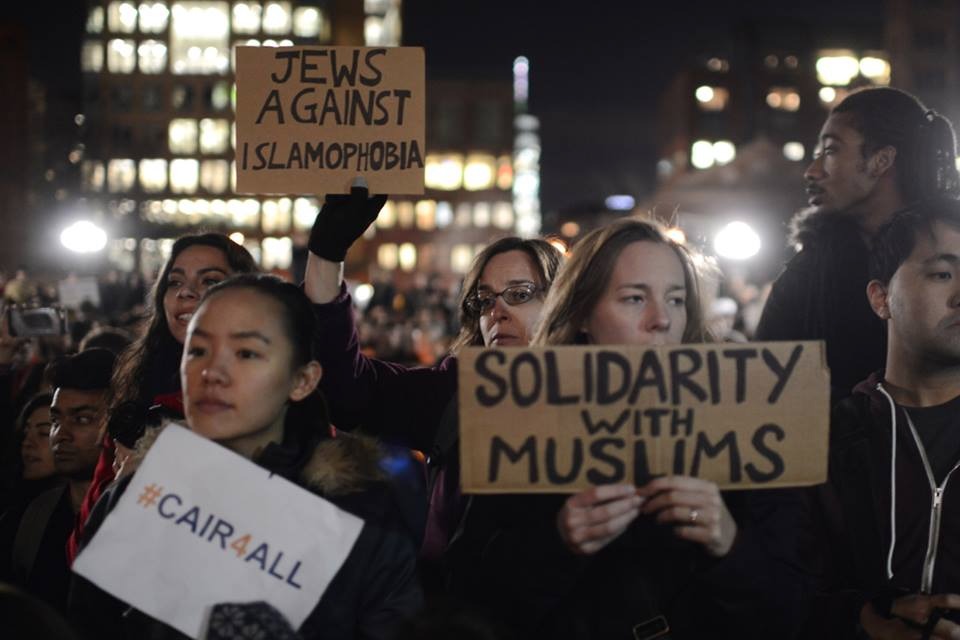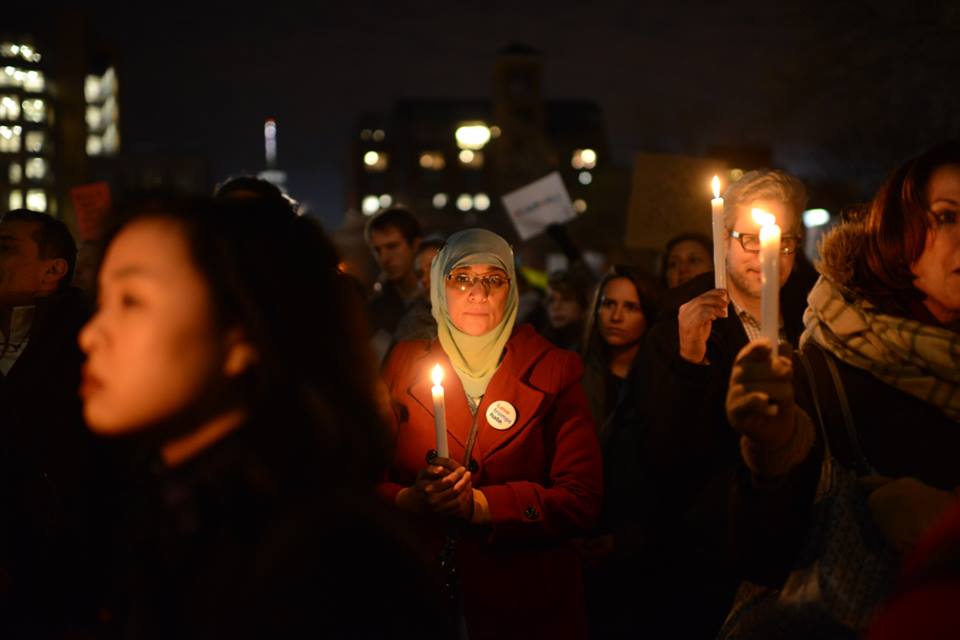American Jews view a Muslim ban as a threat to the ideals they cherish, yet they also believe that too many Muslims in Israel is a direct threat to the Jewish people.

In early December, just a month after the election of Donald Trump, American alt-right leader Richard Spencer sat down for an interview with Al Jazeera. Speaking to Kristen Saloomey, Spencer, who brought his white supremacist views along as he was catapulted into spotlight over the past year, railed against the “great erasure” of the “white world,” diversity, and the underrepresentation of American whites in corporate America, among other things.
Spencer has made a career out of adroitly tapping into the teeming rage of a white America after eight years of President Obama. He has successfully suffused public discourse with anti-Muslim, anti-black, anti-immigrant, and anti-Semitic sentiments that at least felt like they were in check under Obama. For years Spencer has been promoting a view of the world undergirded by the belief in both white, European supremacy and its negative: that people of color are not only inferior, they are dependent on the greatness of the master race for any success they may have found. And all this under the cloak of a genteel smile, an affable personality, and a hipster haircut.
The most interesting part of Spencer’s interview, however, focuses on his ideas regarding immigration. While he unsurprisingly opposes illegal immigration and supports Trump’s plan to build a wall on the Mexican border, Spencer is actually far more interested in how “legal immigration” shapes the demographic makeup of the United States.
“The real issue is the demographic change that occurs through legal immigration,” Spencer tells Saloomey. “These people come, they’re here to stay — at least for a long time — they’re coming by the millions, they’re voting, they’re certainly integrated into the welfare system. That is the big problem. We just have to say: this is not your country.”
For liberals, Spencer’s obsession with demography is an affront to the very ideas that underlie their country. After all, they say, the United States was founded on the backs of immigrants. For the alt-right, this means a last-ditch effort at preserving white domination.
Spencer’s view of the world poses a challenge for mainstream American Jewry. The vast majority of American Jews, who lean left and vote Democrat, likely view him as their enemy, and for good reason. On Friday, Spencer retweeted two Gallup polls published at the height of the Nazi regime’s persecution and extermination of European Jewry. According to the first poll, from 1938, the vast majority of Americans at that time believed Jewish exiles from Germany should not have been allowed into the U.S. The second poll, published in 1944, showed that 44 percent of Americans believed Jews held too much power in the U.S. at the time. Just as Trump has effectively banned Muslims from entering the country, the impetus for the retweets cannot be made any more clear.
Yet when it comes to Israel, the demographic rhetoric we hear from American Jews is far closer to that which Spencer espouses. One of the founding tenets of the Zionist project was to provide Jews with a state of their own, where they would be safe after centuries of persecution, violence, and near-total annihilation. But along with that legitimate and understandable desire for safety came an obsession with maintaining a Jewish demographic majority — at all costs. As my colleague Amjad Iraqi wrote on these pages, the irony is that in its desire to escape persecution, Israeli Jews “became an oppressive majority obsessed with racial control. To this day, the Palestinian people — whether in refugee camps, under occupation, or minority citizens inside Israel — are viewed by the Israeli state as an existential challenge.”

The obsession with demographics in Israel, the idea of maintaining a Jewish majority through both legal means and brute force, has been promulgated by nearly all segments of Jewish Israeli society since before the state’s inception. It is the logical conclusion of the state’s guiding ideology — so much so that challenging it is interpreted by many as endangering Jews worldwide. It is a project that has taken a humanitarian need and transformed it into a colonial structure that constantly requires maintenance and reinvention.
Palestinians, meanwhile, look on as Israeli Jews on both sides of the political spectrum squabble over how best to demographically dominate and defeat them. Iraqi explains:
This obsession over the Palestinian ‘demographic threat’ has become so normalized in both Israeli and international discourse that people have forgotten that at its core, it is both a sinister and racist concept. A Palestinian’s personal character, their advancement in society, and even their indifference to politics mean little to the state – it is their blood that determines their status and defines them as a danger. This view has served to legitimize numerous laws and policies that attempt to manipulate the state’s demographic landscape, with the aim of minimizing and containing the non-Jewish population under its control.
The American Jewish establishment has, for the most part, bought into the idea that maintaining a demographic majority in Israel is the only way to secure the safety of Jews across the globe. Generations of American Jews have been raised not only on the notion of Israel’s inherent justness, they have never been asked to question the idea of ethnic and religious supremacy in the Jewish state. These are the same people who were raised on American ideals of civil liberties and equal rights for all.

The dissonance becomes even more acute in the face of President Trump’s Muslim ban. Two prominent Jewish American organizations, the American Jewish Committee (AJC) and the Anti-Defamation League (ADL) on Friday came out strongly against Trump’s new policies against Muslims and refugees, and their outrage is likely shared by the majority of American Jews.
In Israel, however, the government has banned family reunifications between Palestinian citizens with their spouses and children from the occupied territories — effectively tearing entire families apart. The law was was initially touted as a “security measure,” but is now viewed as a way of preventing Palestinians from entering and living in Israel. Meanwhile Israel’s draconian policy on refugees amounts to a simple religious test: if the person fleeing war is not Jewish, it becomes extraordinarily difficult for him or her to receive refugee status, legal residency, or citizenship.
What good is the moral outrage over Trump and Spencer when American Jews overwhelmingly support Trump-like policies in Israel? How can it be that a Muslim ban in the U.S. is seen as a threat to the democratic ideals so many American Jews cherish, while too many Muslims in Israel is interpreted as a threat to the Jewish people? American Jews will have to make a choice: maintaining a double standard or fighting for equality for everybody — and that means everybody.

